- Home
- Jane Smiley
Saddles & Secrets (An Ellen & Ned Book)
Saddles & Secrets (An Ellen & Ned Book) Read online
ALSO BY JANE SMILEY
Riding Lessons (Ellen & Ned Book 1)
The Georges and the Jewels
A Good Horse
True Blue
Pie in the Sky
Gee Whiz
THIS IS A BORZOI BOOK PUBLISHED BY ALFRED A. KNOPF
This is a work of fiction. Names, characters, places, and incidents either are the product of the author’s imagination or are used fictitiously. Any resemblance to actual persons, living or dead, events, or locales is entirely coincidental.
Text copyright © 2019 by Jane Smiley
Cover art copyright © 2019 by AG Ford
All rights reserved. Published in the United States by Alfred A. Knopf, an imprint of Random House Children’s Books, a division of Penguin Random House LLC, New York.
Knopf, Borzoi Books, and the colophon are registered trademarks of Penguin Random House LLC.
Visit us on the Web! rhcbooks.com
Educators and librarians, for a variety of teaching tools, visit us at RHTeachersLibrarians.com
Library of Congress Cataloging-in-Publication Data is available upon request.
Ebook ISBN 9781524718176
Random House Children’s Books supports the First Amendment and celebrates the right to read.
v5.4
ep
Contents
Cover
Also by Jane Smiley
Title Page
Copyright
Chapter 1
Chapter 2
Chapter 3
Chapter 4
Chapter 5
Chapter 6
Chapter 7
Chapter 8
Chapter 9
Chapter 10
Chapter 11
Chapter 12
Chapter 13
Chapter 14
Chapter 15
Chapter 16
Epilogue
About the Author
After my lesson at Abby’s ranch on Sissy, who is not as bad as she was in the spring, and can now even jump a little bit, Abby said that I had to learn something new, and I was sort of excited, but then the thing I was to learn was how to clean my saddle. I had to carry my own saddle into the tack room and put it on the saddle rack (I groaned a little so that Abby would know that the saddle was heavy, but she just laughed and handed me a sponge and a piece of soap that was blond and didn’t smell anything like flowers). I watched her and did what she did—rubbed the sponge on the soap and then on the saddle and then on the soap and then on the saddle. She was fast. I was slow. And okay, I did close my eyes and let my mouth hang open a little so that she would think I was falling asleep, because one of the best ways to get through something boring is to make jokes.
While my eyes were closed, I thought maybe I really had fallen asleep, because I heard something I had never heard before, a deep, melodious voice singing, “From this valley they say you are going. We will miss your bright eyes and sweet smile.” My eyes popped open, and I looked right at Abby, who didn’t seem to hear a thing. The song went on, “For they say you are taking the sunshine that has brightened our pathway awhile.”
Abby kept soaping.
I did, too. I listened to the end, and afterward there was silence, except for the soap soap soap. I finally said, “Did you hear something?”
“What?”
“A sad song.”
“Oh, sure. ‘Red River Valley.’ That’s one of his favorites.”
“Who?”
“My dad. If he’s in a good mood, he sings a sad song.”
I said, “I never heard him sing before.”
“Really?” She did not seem impressed. To me, it sounded like having a radio in your own barn. After a minute or so, she said, “He likes singing in the barn because the acoustics are good.”
“What does that mean?”
“The walls and the ceiling make his songs sound richer.”
“Don’t you like it?”
“I do, but I hear it all the time.”
I bent down and went under the rack, which is really just a two-by-four on some legs, and started soaping the other side of my saddle. Abby’s dad is scary. He always wears a big cowboy hat pulled over his eyebrows, and when he isn’t wearing it, like at lunch (I have stayed for lunch twice), his eyebrows go down over his eyes like they don’t know any better, which makes him look angry. He also has a loud voice, but now that I’ve heard him sing, I think that might not be so bad. We soaped and soaped, then Abby went over to the hooks and got the bridles. I sighed. She smiled, but didn’t say anything. I heard her dad start another song, but he went outside and was walking away, so I couldn’t hear it anymore. “Red River Valley.” Well, I have heard that song before. Grandma sings it under her breath sometimes, or hums it. I said, “Your dad singing that song was a once-in-a-lifetime experience.”
Abby said, “Ellen, you are so funny. He’ll be very glad to hear that.”
We unbuckled all the buckles and took the bridles apart and cleaned them one strap at a time. We even used an old toothbrush to clean the bits. Afterward, I ran out of the tack room to the pasture, where Ned was standing by the fence. I gave Ned a bit of carrot that I had been saving for him, and then a little kiss on the nose. He wasn’t mine yet, but we were taking baby steps in that direction, such small baby steps that no one had noticed them except me.
I am in fifth grade now. School started a month ago, and then, two weeks ago, it was Abby’s birthday, and my mom and I went to the big department store where she used to work, and we pushed Joan Ariel down all the aisles and looked at all the stuff for sale. Mom worked for a long time in women’s clothing, and for a short time in children’s shoes and clothing, and also in kitchenwares. She knows the whole store. Every time I ask her, she says that she never worked in the toy department, but Grandma says that she did, she just doesn’t want me to know, because then I will nag her. Nagging is my absolute best talent, even though I call it “making my case.” My dad likes this show on TV, Perry Mason. Perry Mason argues about everything and he always wins.
What we found for Abby was not a sweater, like Mom wanted, or a dinner plate with a longhorn cow on it, which Joan Ariel (I said) kept pointing at (Joan Ariel loves to point at things and go, “Ba ba ba!”), but an Instamatic camera. I saw it when we first walked into the store, because it was near the door, and I kept talking about it, and then in the end, Mom put her hands on her hips and said, “Well, okay then!” This is what Dad calls “the slow drip.” You suggest something enough times, and they give in. The camera cost eighteen dollars, but Mom still gets her 20 percent discount, so, hello, Mr. Nathan, my fifth-grade teacher, that comes out to fourteen dollars and forty cents. I figured that out in my head. I spent my own money on two film cartridges, and maybe that will last her until Christmas. My plan is that she will take a lot of pictures of Ned.
I need a lot of pictures of Ned because I don’t see him very often. Before this week, I hadn’t seen him since August, and before that, I had only seen him twice since I rode him—well, got on him—in the spring on the day of the Kentucky Derby (that’s my secret, and Ned’s, too). Blue has been at the stables for five and a half months—all through the showing season. I keep telling Jane, who runs the stables, that he needs a break, but she just laughs at me and says that he is fine. And it is true that he is glossy and handsome and completely well behaved, like a saint, as my grandma would
say. Ned hardly talks to me anymore, which makes me sad, and also makes me wonder if he ever talked to me at all.
I have an excellent imagination.
After we put the saddles on the saddle racks and the bridles on the bridle hooks, we went back outside. Abby said, “Isn’t it such a beautiful day!”
I said, “When are you going to ride Ned?”
“How long are you staying?”
I looked at my watch. “About another hour. Dad is looking at cars. He loves to look at cars. I could stay all day and he wouldn’t notice.”
“My dad is like that about horses.”
Another good thing about Abby’s dad.
“Okay, I’ll ride Ned now, and you can get on the new pony. He’s very easygoing, and I’m getting a little big for him.”
“Are you giving me another lesson?”
“No. You’re being my exercise rider.”
Exercise riders are the ones at the racetrack who ride the horses early every morning, then the jockeys come out and ride them in the races. Sometimes an exercise rider gets to end up as a jockey, but most of the time, the exercise riders are too big to be jockeys. Jockeys are grown-up men who are maybe two inches taller than I am. I am 4'11" and wear a size five shoe. We had gotten measured that week. I said to Abby, “Did you get measured this week?”
“No. They don’t do that in high school unless you’re playing a sport, but I know how tall I am because I went to the doctor for my checkup. I’m five feet eight inches. He thinks I’ve stopped.” She looked relieved. She is taller than her mom. I’m not taller than my mom. I wish I were.
By now we were at the pasture gate. The chain wraps around and around it because Abby’s jumper, Gee Whiz, loves to open the gate and wander. He doesn’t jump out of the pasture, though, which I don’t quite understand, because the pasture fence is 4'6", and he can jump that high. If Ned were still talking to me, I would ask, but he isn’t.
After we had taken Ned and the pony, whose name is Hot Potato, out of the pasture and wrapped the chain around the gate and the fence over and over (I saw Gee Whiz looking at us, too), I walked along behind Ned and watched him. I am sorry, but even though he is maturing (you never say “growing up” about a horse, because a horse usually gets to be his or her full height at two, which is like a teenager in human terms), he still reminds me of a puppy. I said this in front of him last spring, and he walked away like he would never forgive me, but what is wrong with a puppy? Puppies are always cute and everyone loves them; they are soft and rounded all over and do lots of things with their bodies. When Ned lies down to roll, he goes from one side to the other, which many horses can’t do, and he also throws his legs around and wiggles. To me, that is like a puppy. All that I meant was, he reminds me of a puppy, but a beautiful puppy.
Hot Potato is a red roan Welsh cob. I said these words to myself after Abby said them to me. While we groomed Ned and Hot Potato, she told me all about him—he’s sixteen years old, and he was imported from England when he was four and his English owners came to live near the stables. They showed him for a while, but the girl and then the boy grew out of him. He has since had two other owners, who also grew out of him, which is what happens with ponies. He’s mostly sound but a little nippy, and Jane, at the stables, thinks that he needs some time with Abby and her dad, a little retraining after years of doing things his way. Abby said, “Keep your eye on him, and if he pins his ears and turns his head toward you, just present your elbow so that his nose hits it before he nips at you. That way, he will think it’s his fault.”
Abby and her dad think that horses do best when they punish themselves rather than when you punish them. I did what I was told because I didn’t want to get nipped, but that meant that I couldn’t pay much attention to Ned.
Until we were on them, and in the arena. Once we were in the arena, I could feel in my own body that Hot Potato was sighing and saying to himself, “Oh, this again; I know how to do this,” and everything I asked him to do, he did. Abby watched us for a while, I guess to make sure we were getting along. We walked here and there, looking at the jumps and up the hill and over at the pasture, then we trotted some circles and loops, then we walked again, and then we cantered some figure eights. Hot Potato is a little chunky, or “heavyset,” as my mom says, but he moved nicely, and his canter was loose and rhythmic. When I came down to the walk, Abby said, “I guess in England, some of them were used in coal mines, and they take them foxhunting. All sorts of things. I like him. I don’t think he looks sixteen, but then, ponies live into their thirties.”
I said, “Do they get bored?”
“Well, maybe that’s his problem at this point. He’s been good for too long.”
That, I could understand.
Now Abby picked up her reins and began working Ned. Hot Potato and I stood quietly and watched for a while. Ned knows a lot more than he did in the spring, especially about going slowly and rating himself, which means controlling his stride and rhythm rather than just doing what comes naturally, which for Ned, and most racehorses, is going fast and stretching out. The first thing Abby did was walk and then trot around each of the fences, in loops and circles, then she walked on the bit, which means you are holding the reins tightly enough that you can feel attached to the horse’s mouth, and then she walked on a loose rein, and even on the buckle. This lasted for maybe ten minutes, and looked good, and I thought that Ned was trained, but then I saw a funny thing, which was that he started pricking his ears and looking around and picking up speed. Abby tightened the reins just a little but kept going. Now Hot Potato pricked his ears and looked around, too—I felt him shift under me, so I started walking again. But almost immediately he stopped looking around and just kept walking. I didn’t see anything, not even Abby’s dog, Rusty, walking along the hillside. Everything was quiet.
Everything but Ned. Abby trotted some circles. Ned had his head up, but then he lowered it and went around properly, bending his body as if he knew where the circle was and that it had to run from his nose to his tail. He blew some air out of his nostrils, and then Hot Potato blew some air out of his nostrils, and I kicked him a little and we trotted along the fence line. At the gate, even though he was on a pretty loose rein, I got him to turn in a nice loop. I could see Ned and Abby at the far end of the arena. They had come down to the walk and now lifted into the canter, and they cantered along for four strides. Suddenly Ned threw up his head, tucked his hind end, and ran away, not as if he was mad or racing, but as if he was scared to death. Hot Potato watched him. I picked up my reins, because sometimes when one horse does something, the others decide to do the same thing, but Hot Potato is sixteen and Ned is four (which means, Mr. Nathan, that Hot Potato is four times as old as Ned), so Hot Potato stood quietly. Ned bucked and Abby shifted to one side before taking hold, bringing him down, and getting him to walk. They came over to us. He kept looking around. He was breathing hard. When they got to us, Abby said, “I do not know what we are going to do with this horse.”
I said, in my own mind, “Ned, what is going on?”
Ned said nothing.
When you come back to school in the fall, everything is different, even if you’ve been seeing the other kids over the summer. For example, my friend Ann and I would meet a couple of times a week, either down the hill from my house, at a little peninsula called Lovers Point, to look for seashells (Ann has a collection), or up the hill from the school to play tennis, which mainly meant trying to hit the ball back and forth over the net and hoping for the best. I was glad to get out of the house, and Mom was glad to be rid of me, so I didn’t mind going, and I would imagine riding Ned up and down the hills or along the beach. And now Ann is back in my class this year, but at lunchtime on the first day of school, I came in late, and she was already sitting with two girls from her class last year, so I sat down with Melanie Trevor, who was alone, and then Ruthie Creighton crept
in and sat with us. Todd sits with the boys, and he isn’t in our class anyway. I maybe mind about Ann and maybe don’t, since Melanie is the world’s best student and most interesting person, and Ruthie still doesn’t say much, but she smiles more than she used to and keeps her socks pulled up (I took her around behind the school on the second day and told her how to do it, and then I reminded her when she needed it for the next few days, and now she does it). Melanie does not do what I say—I do what she says—and Ruthie does what I say, and so we get along, and I can see across the lunchroom that Ann and those girls have little arguments all the time. Does Melanie like me? I have no idea. I didn’t see her during the summer, because she goes to overnight camp for the whole time. She thinks I’m funny, and that’s enough for her. It’s a good thing that we sit at opposite ends of the second row of desks in Mr. Nathan’s class, otherwise I might look at the answers on her papers. I see Jimmy Murphy doing that, but he must not learn anything, because she gets A’s and he gets C’s, and that is that.
As for Ruthie, things seem better at her house. She brings her own lunch now, so maybe that’s why she is willing to sit with us. Mom still tut-tuts when we pass her house pushing Joan Ariel in her stroller (Joan Ariel gets a lot of stroller exercise because Mom believes in fresh air), but last Sunday we stopped to admire a lemon tree in a pot at the bottom of the steps (Mom loves the smell of lemon blossoms), and a lady in a cap with a bucket came around the house. She and Mom went on and on about the lemons, and then the lady said that she was Ruthie’s aunt, she was living with them now, she worked in the bakery at the market, and then they talked about Bundt cakes until Joan Ariel started fussing, because she would much prefer moving to sitting in one place. Then Ruthie’s aunt, whose name is Mrs. Larsen, said what a cute baby, and so on, and we kept walking.

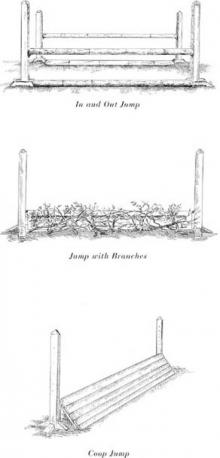 The Georges and the Jewels
The Georges and the Jewels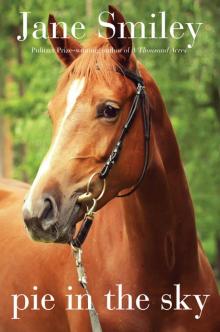 Pie in the Sky: Book Four of the Horses of Oak Valley Ranch
Pie in the Sky: Book Four of the Horses of Oak Valley Ranch Duplicate Keys
Duplicate Keys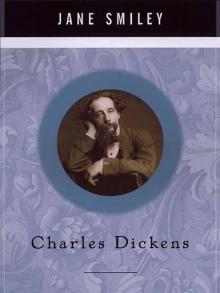 Charles Dickens
Charles Dickens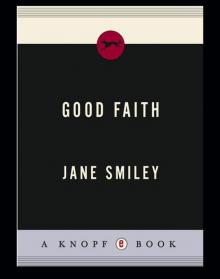 Good Faith
Good Faith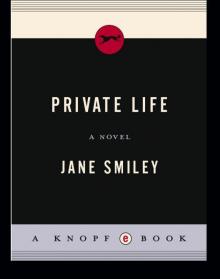 Private Life
Private Life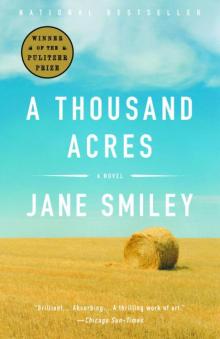 A Thousand Acres: A Novel
A Thousand Acres: A Novel The Greenlanders
The Greenlanders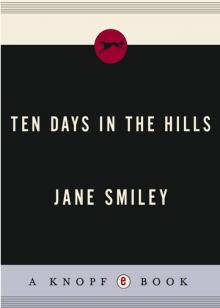 Ten Days in the Hills
Ten Days in the Hills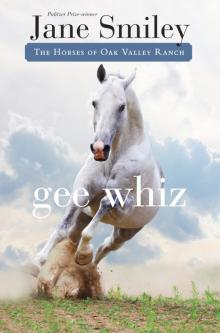 Gee Whiz: Book Five of the Horses of Oak Valley Ranch
Gee Whiz: Book Five of the Horses of Oak Valley Ranch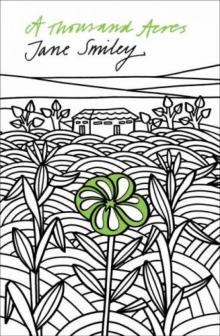 A Thousand Acres
A Thousand Acres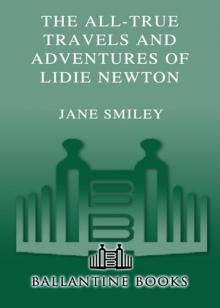 The All-True Travels and Adventures of Lidie Newton
The All-True Travels and Adventures of Lidie Newton Ordinary Love and Good Will
Ordinary Love and Good Will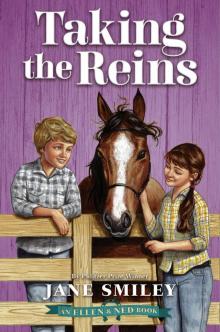 Taking the Reins (An Ellen & Ned Book)
Taking the Reins (An Ellen & Ned Book)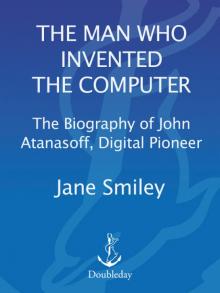 The Man Who Invented the Computer
The Man Who Invented the Computer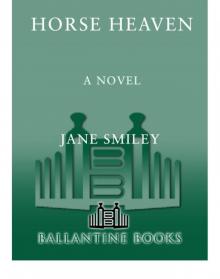 Horse Heaven
Horse Heaven The Age of Grief
The Age of Grief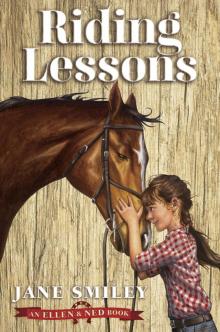 Riding Lessons
Riding Lessons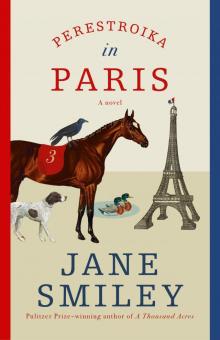 Perestroika in Paris
Perestroika in Paris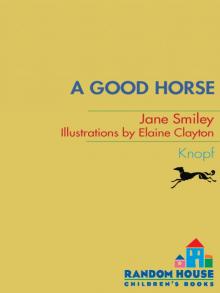 A Good Horse: Book Two of the Horses of Oak Valley Ranch
A Good Horse: Book Two of the Horses of Oak Valley Ranch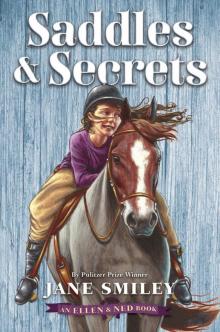 Saddles & Secrets (An Ellen & Ned Book)
Saddles & Secrets (An Ellen & Ned Book)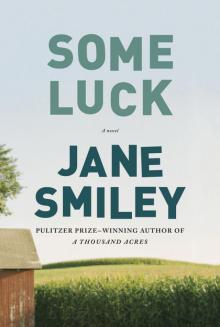 Some Luck: A Novel
Some Luck: A Novel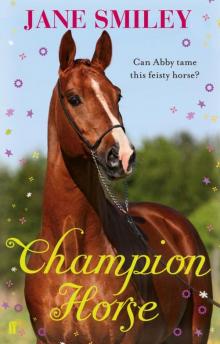 Champion Horse
Champion Horse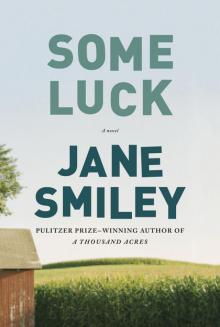 Some Luck
Some Luck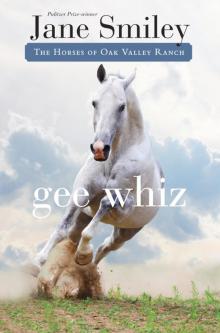 Gee Whiz
Gee Whiz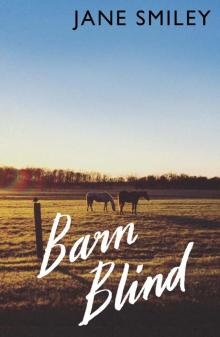 Barn Blind
Barn Blind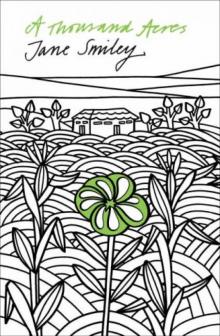 A Thousand Acres (1992 Pulitzer Prize)
A Thousand Acres (1992 Pulitzer Prize)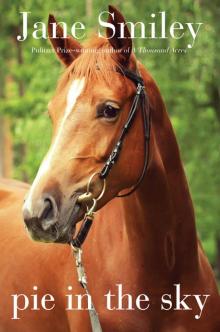 Pie in the Sky
Pie in the Sky True Blue
True Blue A Thousand Acres_A Novel
A Thousand Acres_A Novel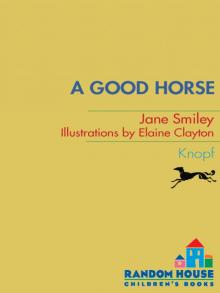 A Good Horse
A Good Horse